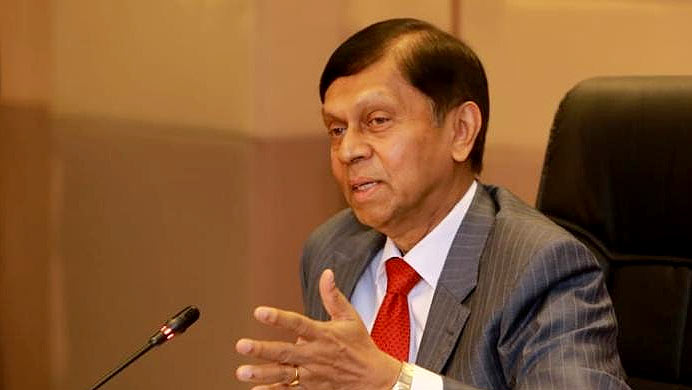CBSL Governor sees negative fallout from IMF deal

Central Bank Governor Ajith Nivard Cabraal opined that seeking International Monetary Fund (IMF) help to resolve a debt and forex crisis would lead to a currency depreciation and sharply higher interest rates, trimming the public sector and leading to the privatization of state enterprises.
However, several policy corrections, which are usually in IMF deals, have been already done, he said.
Sri Lanka has been downgraded to CCC by rating agencies indicating a higher risk of default as the country printed money to keep rates in a “monetary stimulus” on top of a “fiscal stimulus” and lost foreign reserves as the printed money was exchanged for dollar reserves to maintain the exchange rate.
The Cabinet of Ministers has discussed the possibility of the Government seeking IMF assistance to resolve the external crisis as it became more difficult to import oil and other goods.
The party had come to power slamming the last administration for going to the IMF, which led to tax hikes.
“If we want, there is no problem going to the IMF. We had gone in 2009. So nobody should think that we hesitate or fear to go,” Cabraal said last week.
“The IMF could tell us to depreciate the rupee, raise the interest rates by 30 percent, 40 percent, 50 percent further, reduce the number of government sector employees, reduce or curtail pension benefits, and sell various state assets.
“These are some conditions they include in their reform agenda. Our view is that we do not need that reform agenda at this juncture. Without going for that, we can pay back our creditors. Though we see some pressure during this time, we know that will ease in the time ahead, “he said.
The last IMF programme failed to impose sufficient controls on the Central Bank giving it enough room to print money under discretionary flexible inflation targeting and triggered a second currency crisis in 2018 within the program leading to an output shock.
It also failed to impose spending controls on the Treasury ‘under so-called revenue based fiscal consolidation’ sans ‘spending based consolidation’ leading to a steep rise in Government spending and an increase in state sector pension entitlements.
The currency fall which usually comes under an IMF programme leads to a fall in real wages, a consumption fall, higher unemployment and an economic slowdown – the inevitable consequence of monetary and fiscal excesses – which leads to unhappy voters if elections come before growth recovers.
Cabraal, however, said Sri Lanka itself has been already doing what the IMF might prescribe in a policy package.
“The issue is we need to face the debt problem,” Cabraal said. “The main reason for the debt problem is that US$ 6.9 billion had been borrowed as loans via Sovereign Bonds to this country from 2018 April to 2019 June. Those loans have put a lot of pressure on the country’s debt.”
“So we have decided to do away with that kind of borrowing and reduce them while using some other borrowing methods. That is what we are doing right now. This will be the same advice the IMF will give us.”
“Debt restructuring is basically you change from one instrument to another. This has been done with a deep thought and scientific manner. Since we are already doing it, we do not need external help to do that.”
He also said the Government has already taken decisions to change the maximum retail prices of various commodities.“In some instances, we have removed the price controls which could be told by the IMF.”
The budget for 2022 had already frozen recruitments, raised taxes on companies including turnover based taxes and there were no salary hikes for state workers except for the striking teachers.However any IMF programme now is likely to require the float of the currency as a prior action to restore the foreign exchange markets.
(Source: Daily News – By Ravi Ladduwahetty)
Latest Headlines in Sri Lanka
- Namal Rajapaksa summoned to court over Krrish transaction February 5, 2025
- Sri Lanka to operate immigration department 24/7 to speed up passport issuance February 5, 2025
- Sri Lanka announces new paddy purchase prices from February 6, 2025 February 5, 2025
- Sri Lanka launches national survey on toque macaque February 5, 2025
- Sri Lankan MPs’ meal price jumps over four times from Rs. 450 to Rs. 2,000 February 5, 2025



The argument above by the CBSL Boss makes sense.
The danger is the risk of loan payment default.
China has apparently ditched us following the Organic Fertilizer debacle.
India is the only hope but knowing the Indians, they will demand their pound of flesh.